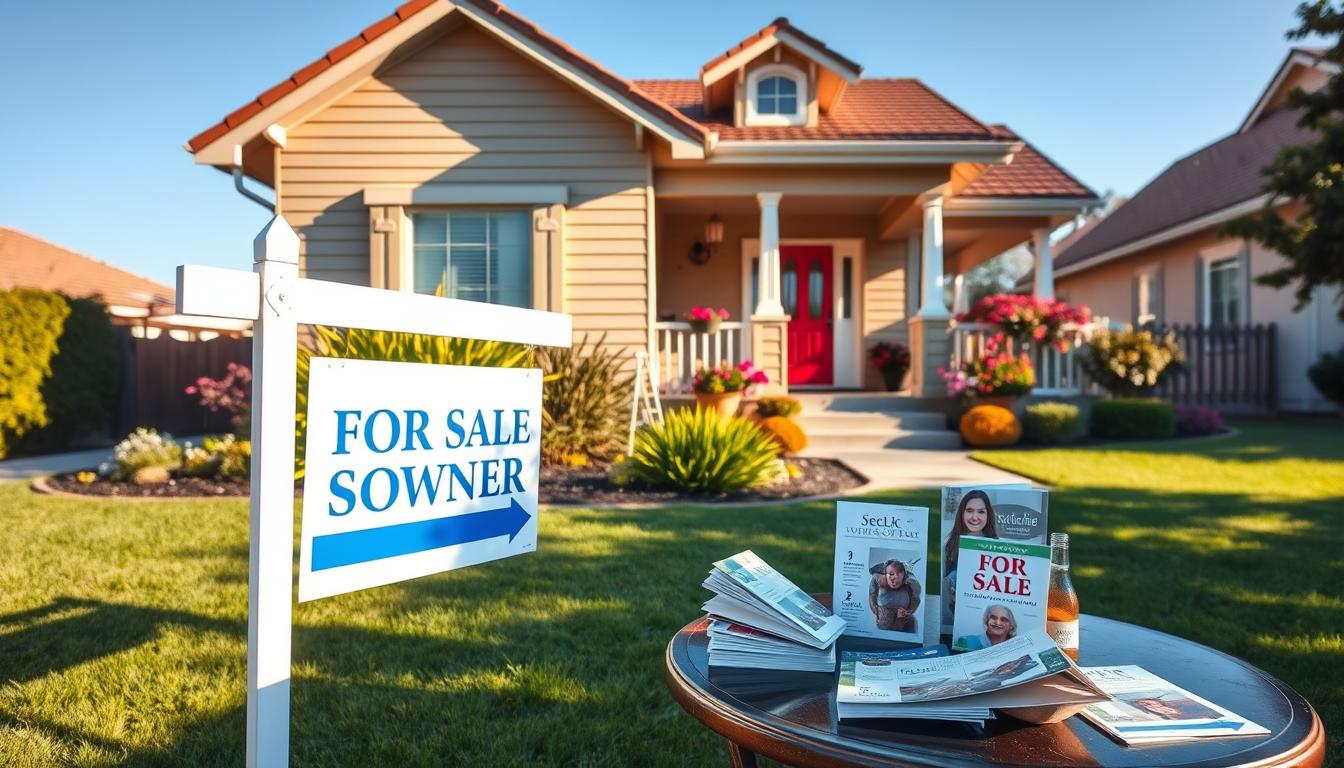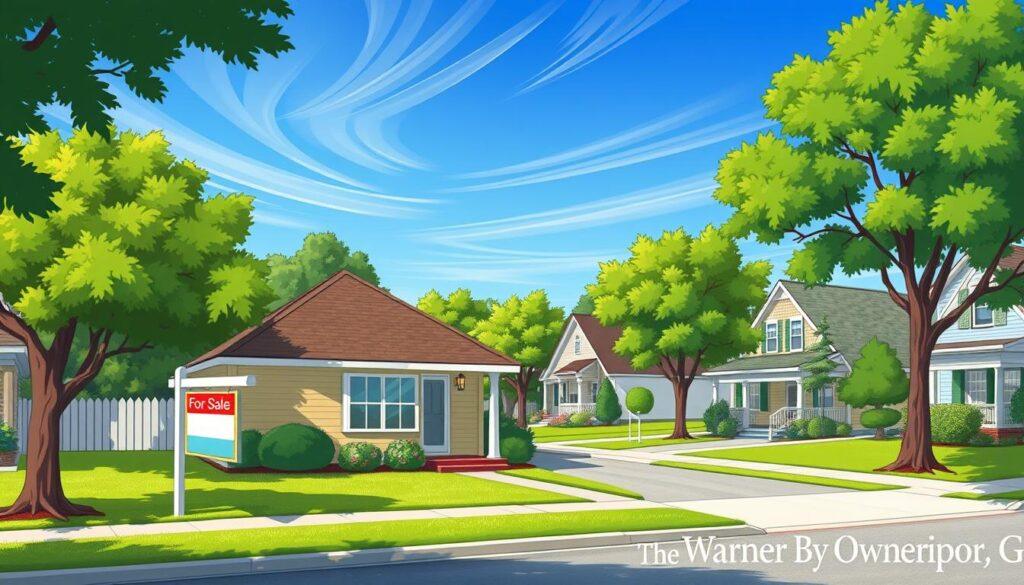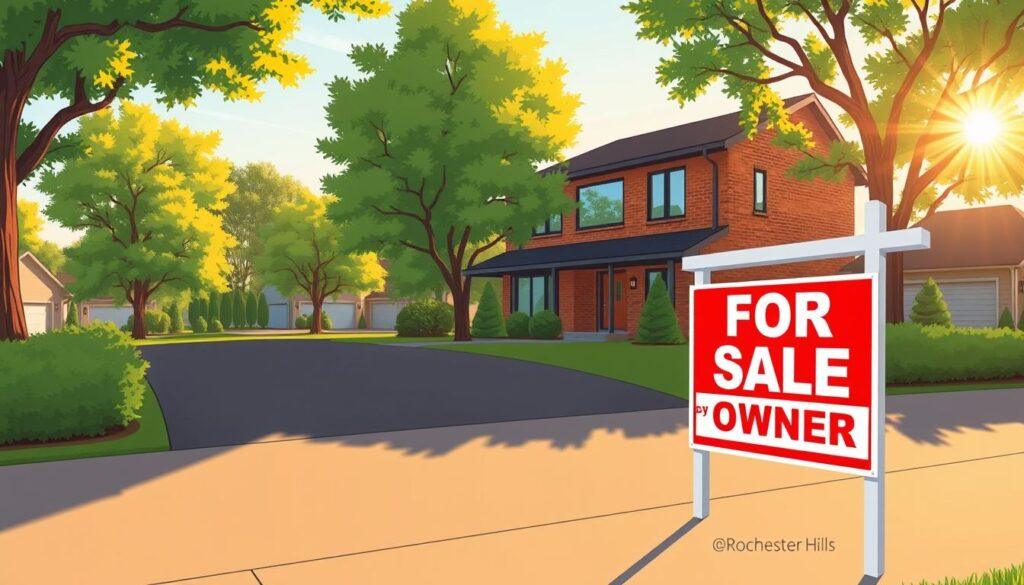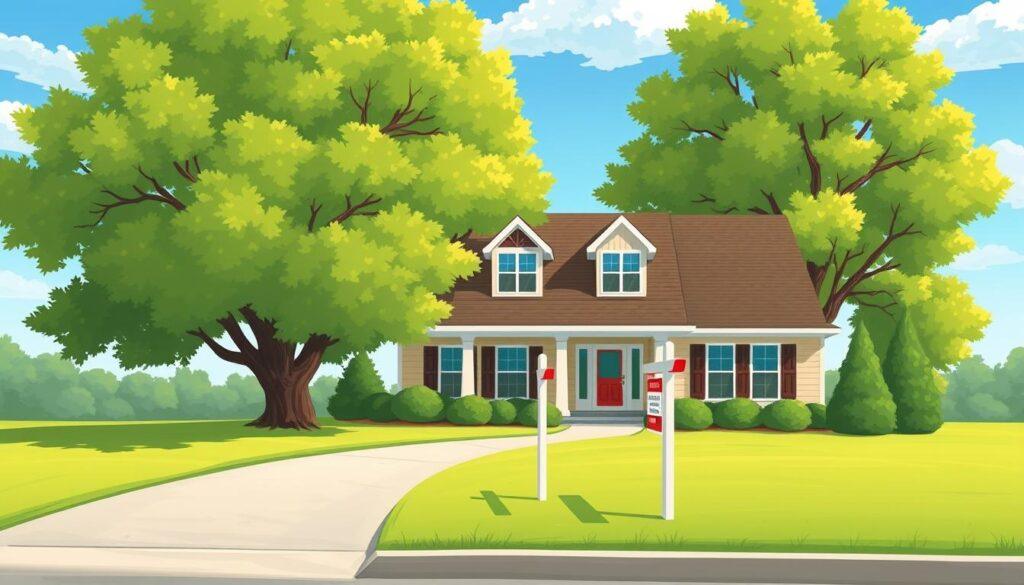Ever thought about selling your home yourself and getting more money than with an agent? Only about 7% of sellers go the “For Sale By Owner” (FSBO) route. Many wonder if they can sell their property privately without help.
Selling your home yourself means you keep more of the profit. But, FSBO listings often sell for less and can face challenges. This article will guide you through DIY home selling, helping you succeed in the FSBO process.
Key Takeaways
- FSBO sellers can save on commission fees, but should be aware of potential trade-offs.
- Homes sold without an agent typically have lower sale prices than agent-assisted listings.
- Proper preparation and pricing are essential for success in the FSBO process.
- Utilizing online platforms and professional photography can enhance visibility and appeal.
- Understanding the legal complexities of home selling is crucial to avoid risks.
Understanding the FSBO Process
The For Sale by Owner (FSBO) process is an alternative to traditional home sales. Homeowners sell their property without a real estate agent. They handle everything from setting the price to showing the house and negotiating.
About 7% of homeowners choose this path to save on agent fees. However, it comes with its own set of challenges.
What is FSBO?
FSBO stands for For Sale by Owner. It means homeowners sell their property directly to buyers. This way, they can sell house without agent and keep more of the profit.
They aim to save on agent commissions, which can be 3% to 5% of the sale price. Many believe it’s simpler and they can keep more money.
Why Choose to Sell By Owner?
Selling property privately has its perks. Homeowners can save money and have more control over the sale. They manage showings, negotiations, and pricing.
This approach also lets them interact directly with buyers. It makes the sales process more personal and open.
Yet, there are challenges. Homeowners must understand local real estate laws and ensure they follow all necessary disclosures. For those new to FSBO, resources like this comprehensive guide can help.
Preparing Your Home for Sale
Getting your home ready for sale is key to attracting buyers and getting a good price. Focus on cleaning, decluttering, making repairs, and staging your home. Each step helps make your home welcoming and highlights its best features.
Clean and Declutter Your Space
First impressions are crucial when selling a home. Start by cleaning and decluttering every area. Remove personal items and too much furniture to make rooms feel open. This lets buyers imagine themselves living there.
A thorough cleaning might cost about $300. But, it can make your home much more attractive.
Make Necessary Repairs and Updates
Then, fix any small issues or maintenance tasks. Fix leaky faucets, patch walls, and update old fixtures. These small changes can lead to big returns.
Focus on renovations that pay off 100% of their cost. These include refinishing hardwood floors, installing new wood floors, and improving insulation. A well-kept home shows you care about it.
Staging Your Home for Showings
Staging your home is vital for attracting buyers. It highlights your home’s best features. Use natural light and fresh decor to make your home welcoming.
Staged homes often sell for 10% more than unstaged ones. Use neutral colors and smart furniture placement to improve your home’s flow.

| Preparation Steps | Actions | Estimated Costs |
|---|---|---|
| Clean and Declutter | Deep clean entire home, remove personal items | $300 |
| Make Repairs | Fix leaks, patch walls, upgrade fixtures | Variable |
| Staging | Rearranging furniture, adding decor | Variable |
Setting the Right Price
Setting the right price for your home is key to attracting buyers and protecting your investment. Market research, online home value estimates, and a Comparative Market Analysis (CMA) help find the perfect price. This balance appeals to both buyers and sellers.
Conducting Market Research
Good market research shows local trends and sales. It helps understand where your home fits in the market. You might find that many homes are priced lower than expected.
Sellers often want to price their homes like their neighbors. But, market conditions may require a more realistic approach.
Using Online Home Value Estimates
Online tools like Zillow give a rough idea of your home’s value. But, these estimates might not always be right. Remember, a home’s value isn’t about how much you love it. It’s about what the market says.
Creating a Comparative Market Analysis (CMA)
A CMA gives a detailed look at your home’s value. It considers many factors, like how long homes sell and the price per square foot. Real estate agents use the MLS for this analysis.
A professional appraisal costs about $500 but is the most accurate. With all this info, sellers can set a fair price.
| Key Factors in CMA | Description |
|---|---|
| Number of Sold Homes | Indicates demand levels in the area. |
| Average Days on Market | Shows how long homes take to sell, influencing pricing strategy. |
| Average Sale Price | Assists in gauging competitive pricing in the neighborhood. |
| List Price to Sale Price Ratio | Helps identify how much homes sell for compared to their listing prices. |
| Price per Square Foot | A common metric for evaluating property values in a specific region. |
Marketing Your Home Effectively
Marketing your home well is key to selling it on your own. Start by using professional photography to show off your property. Good photos grab the attention of potential buyers and boost interest.
Studies show homes with great photos sell 32% faster. This highlights the power of good visuals in your listing.
Utilizing Professional Photography
Professional photos are a must when marketing your home. They showcase your property’s best features and let buyers imagine living there. Clear, well-lit photos are crucial for your online presence.
Listing on Major Online Platforms
Listing on big online sites like Zillow and FSBO.com can help a lot. Most buyers look for homes online, with 87% doing so. These sites reach a wide audience, increasing your chances of getting noticed.
Using the MLS can also attract more serious buyers. For tips on listing, check out this resource.
Traditional Advertising Techniques
Don’t forget about old-school advertising too. Putting up flyers in community centers and yard signs can attract locals. Word-of-mouth also helps spread the word.
Using these traditional methods alongside online efforts makes your marketing stronger. It ensures you cover all bases.

Handling Showings and Open Houses
Managing showings and open houses is key for FSBO sellers to attract buyers. It’s important to schedule viewings well. Be available to show your home when buyers can come.
Peak times are usually non-holiday Sundays from 1 to 4 p.m. This helps draw more visitors. Having a clear schedule shows you’re professional and makes things easier for everyone.
Scheduling Viewings
Getting ready for open houses needs careful planning. Make your home welcoming with a clean and decluttered space. Many choose professional cleaning to make their homes shine.
Also, create a detailed property summary packet. Include the asking price, property description, and neighborhood highlights. This helps buyers feel informed and interested.
Preparing for Open Houses
Advertising your open houses is vital. Use social media, community groups, and real estate websites to promote them. After the open house, send emails to attendees.
Thank them for coming and share more details. This keeps communication open and boosts your sale chances. For more tips on hosting open houses, check out this comprehensive guide.






